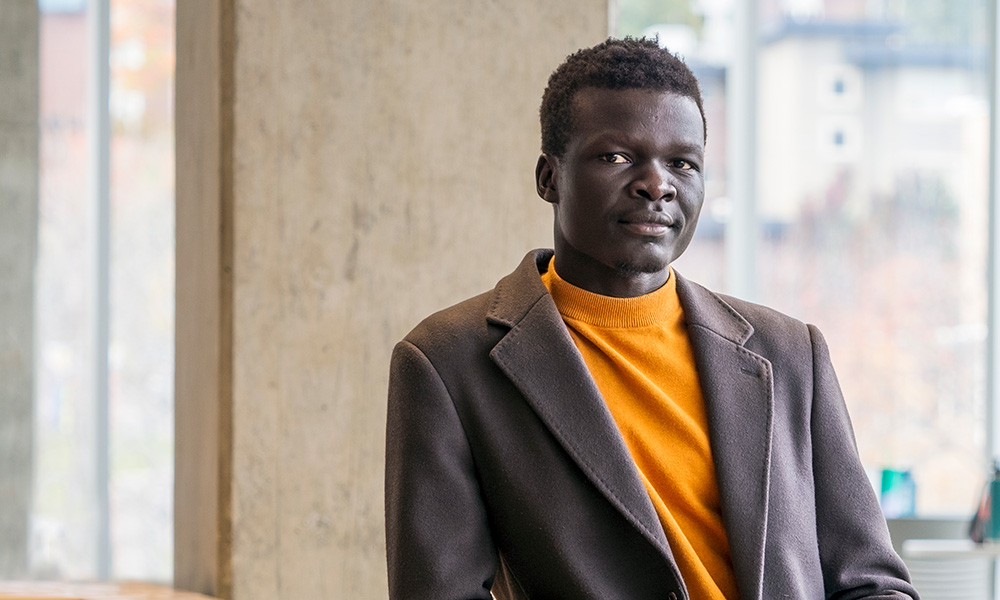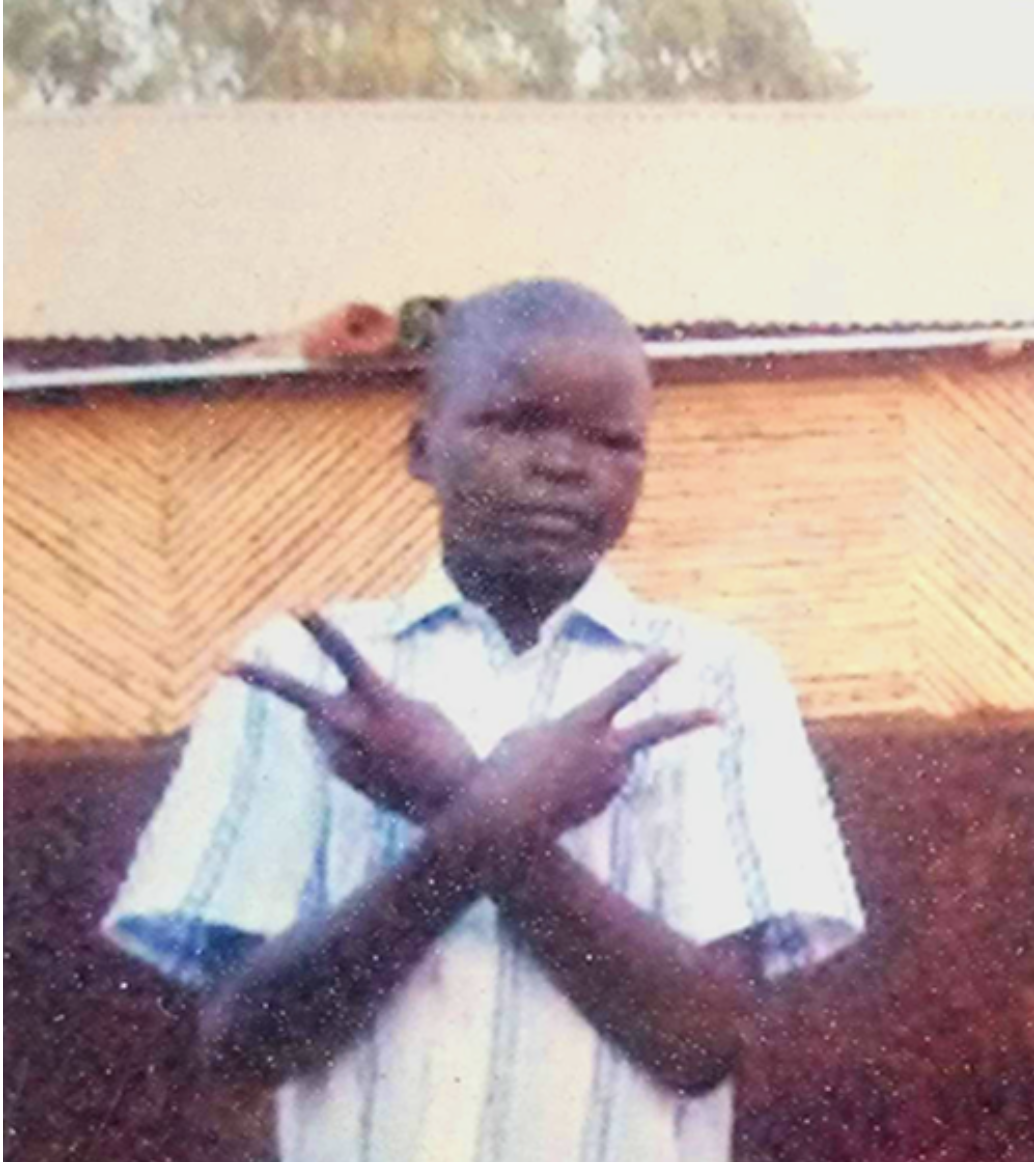Campus Life, People, Student Life, Student Profile
The Boy Who Carried Books: Part I
February 5, 2023

About
Name
James Magok Achuli
Role
Undergraduate Student
Program
International Relations
Faculty
Irving K. Barber Faculty of Arts and Social Sciences
Campus
Okanagan (Kelowna, BC)
Hometown
Tali Payam, South Sudan
“I was honestly worried about my future. People are born and raised in these refugee camps and die there, especially in Africa. Refugees don’t have access to higher learning. I was really, really worried; I was constantly thinking about my education because I knew that was my hope.”
*We have respectfully borrowed the title of James’ book in progress, The Boy Who Carried Books.
WHEN ASKED ABOUT HIS EARLY LIFE, UNDERGRADUATE STUDENT JAMES MAGOK ACHULI has a response that most of his peers have thankfully never endured.
“My childhood was stolen away from me. The future has always been very unpredictable,” explains Achuli, who was born and raised in South Sudan. Ethnic violence and a civil war marred the newly formed country between 2013 and 2020, meaning Achuli spent his formative years as an internally displaced person—the term for citizens who have not crossed a border to safety and are instead on the run in their home country.
When Achuli was a child, a typical day was spent without food in a refugee camp alongside his family, friends, and thousands of other citizens fleeing the war and violence. “We were lucky if we had a meal a day, and there were some days I didn’t eat at all.”
While education also wasn’t a reality in the camp, that didn’t deter the young Achuli, who cherished a small collection of books he kept protected in his waterproof UNICEF backpack. “There was this helicopter that would bring us food in the village,” he recounts. “I was always curious how it flew, and my father told me, ‘If you learn how to use the book and the pen, you will fly that metal in the air.’ It was always in my mind to go to school, and my books were like my education. They were a symbol of hope for me and the future.”
But before he could realize his dream of a formal education, Achuli was displaced by war and separated from his family. At the age of 12, he won a scholarship to a school that neighboured military barracks; when a second civil war broke out, the school he attended was eventually targeted and children were forcibly conscripted into the army.
“One night I was studying with my friend Deng—he was studying chemistry and I was reviewing geography. Suddenly there was a loud explosion and shooting, and kids ran and jumped through windows. Deng was shot in the stomach and was bleeding to death. In the middle of the night, I told him I was going to run away, and he said the soldiers would kill me. So, I took Deng’s blood and spread it on me, and we pretended to be dead people. We hid under a huge table all night long, and in the morning Deng died. It was one of the hardest things I’ve ever experienced.”
Achuli was eventually found alive by the government forces and conscripted into the army, where he was trained to become a child soldier. He quickly became an asset to the unit’s commander, who used Achuli’s expertise in math and geography to help him with terrain. After three months of working alongside the commander, Achuli escaped with his waterproof backpack and books. He jumped into the river, swam across and then walked four hours to a neighbouring town, where he was able to take shelter with others in a church. The group was planning to walk to a refugee camp in Uganda, more than 500 kilometres away.
“One of the toughest questions I had to ask myself was whether to go with this group. I didn’t know where we were going, to be honest. But from what people told me, we were going to find food, safety and education, so when I heard those words, I was really hopeful and excited. I joined them without any close family or relatives to help me.”

One of the few photos James Achuli has of himself as a young child.
The route to Uganda was difficult and treacherous for the group of over 100 refugees: “I had to rely on mud, leaves, snails… anything to fill my stomach since there was no food. I had to beg from people who had food for their own children,” explains Achuli. Group members, including a close adult friend who watched over young Achuli during the trek, were killed by snakes, hyenas and crocodiles.
But perhaps the most harrowing experience for Achuli took place along the riverbank during his trek to the refugee camp. Groups were being ambushed along the route and killed based on their names and what tribe it was thought these people belonged to. Achuli was mistaken as a member of South Sudan’s largest tribe, and soon he was tied up and a black cloth was placed over his head. He pleaded he was from the Mundari tribe, the smallest tribe in the country, and told his attackers to look at his books for proof.
“A woman there actually listened to me and looked at my books, which described where I was born, my mother and my village. Those little stories I wrote and those books saved my life because if I didn’t have those books, they would have killed me like they killed other people.”
When Achuli arrived in Uganda, he was taken in as part of UNICEF’s orphan and vulnerable children program. While there was food and education in this camp, Achuli’s mind was constantly full of memories and worries.
“The violence disappeared, but not in our brains. We always had those memories in the camp. Although it was safer and we had access to UNICEF-funded schools, I was honestly worried about my future. People are born and raised in these refugee camps and die there, especially in Africa. Refugees don’t have access to higher learning. I was really, really worried; I was constantly thinking about my education because I knew that was my hope.”
In the next story in this series, learn how James was able to use education to break free from years of living in a refugee camp, and ultimately attend UBCO on a full scholarship.